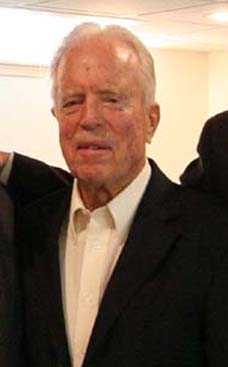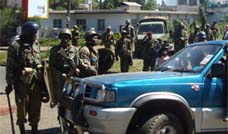
Katie is a Peace Corps volunteer in Aram, a remote village of 1,000 people on a tributary of the Senegal River. French is the national language of Senegal, but the people in Katie's village speak Pulaar, an African dialect. The villagers are Muslim. Katie thinks she is the first Christian, certainly the first white Christian, to live in Aram. In a real sense, she has achieved her goal of experiencing a culture very different from her own. Her assignment as a volunteer is rural health education. She often accompanies a nurse who gives vaccinations to other villagers. The top target of their trips is yellow fever. "I was really having a difficult time with homesickness and culture shock," Katie told the congregation at the First United Methodist Church recently. "I was crying every day," she admitted. Gradually, Katie adapted. After about three months, she said, she began to make a few friends and feel "a little bit of comfort." She relied on her cell phone to talk with her mother each week. That helped a lot.
Katie Wilke is a Peace Corps volunteer in Senegal in Aram, a remote village of 1,000 people on a tributary of the Senegal River
At home in a different land
Winfield woman a Peace Corps volunteer in Senegal
By DAVE SEATON
Publisher
Caption: Katie Wilke of Winfield, a Peace Corps volunteer in Senegal, West Africa, carries a baby boy on her hip. The boy was named “Steve” after Katie’s father, Steve Wilke. He and his wife, Beth, visited Katie in her remote village in late 2006. (Special to the Courier)
She went to Africa to experience a culture "very different from mine."
After most of two years there, Katie Wilke, 25, who grew up in Winfield, has acquired a family, friends and a new language in Senegal.
Katie is a Peace Corps volunteer in Aram, a remote village of 1,000 people on a tributary of the Senegal River.
French is the national language of Senegal, but the people in Katie's village speak Pulaar, an African dialect. The villagers are Muslim.
Katie thinks she is the first Christian, certainly the first white Christian, to live in Aram. In a real sense, she has achieved her goal of experiencing a culture very different from her own.
The father of her host family, Baaba (father) Djibi Mohmadou Niang, is the village chief.
The surname Niang describes a fisherman. He presides over an extended family of 30 who live together in a compound.
Like everyone in the village, the family cooks with wood three times a day, eating meals based mostly on rice and fish. "The core of my Peace Corps experience is being with this Senegalese family," Katie said in an interview. "I help prepare meals, work around the house, play with children, go to funerals and other gatherings. ..."
The Peace Corps is about two-thirds cultural exchange, Katie said.
Her assignment as a volunteer is rural health education. She often accompanies a nurse who gives vaccinations to other villagers. The top target of their trips is yellow fever.
A campaign is in progress to vaccinate the entire population of Senegal against yellow fever.
While AIDS is the disease associated with Africa today, Katie has encountered only one or two cases in her time in Senegal. She acknowledged some infected individuals might not have been diagnosed. Only two percent of the Senegalese population is infected, she said.
The real challenge is malaria, the number one killer in Senegal. "AIDS is the disease we fear in America. We do not fear malaria because we don't have it," Katie said. "But we need more money and people to combat malaria."
Much of her work involves malaria prevention. With skits and demonstrations, she teaches people how to treat mosquito nets with insecticide. The leaves of neen trees mixed with soap and water make an inexpensive insecticide.
A graduate of Kansas State University in communications, Katie had been to Costa Rica on church mission trips and spent a summer studying in France. But her assignment to a small Senagalese village a day's trip from the nearest city at first set her back.
Poder, the regional capital, where Katie had to go for access to e-mail, was 100 kilometers (60 miles) away. The bus stopped frequently and sometimes broke down. It was a three- or four-hour trip. You could not go and return the same day.
"I was really having a difficult time with homesickness and culture shock," Katie told the congregation at the First United Methodist Church recently. "I was crying every day," she admitted.
Gradually, Katie adapted. After about three months, she said, she began to make a few friends and feel "a little bit of comfort." She relied on her cell phone to talk with her mother each week. That helped a lot.
Now Medina, a town of about 12,000 near her village, has acquired a computer. Katie may be able to send e-mail from there when she returns to Africa next week.
Aram has electricity, but it is not connected to homes. Batteries are used to operate radios and an irrigation pump. Only one family has a working television set. Girls sent out to gather wood for cooking have to forage farther all the time, Katie said.
The weather is a huge challenge.
The people of Aram talk of the "hungry season" before the rains come in August and September. "Cows, dogs and people get thin," Katie said." The temperature can reach 120 degrees Fahrenheit in May, the hottest month. After the rains, there is no more precipitation. Dust storms come frequently.
There are 25 volunteers in Katie's group. It started with 36.
In Senegal as a whole, the Peace Corps currently has 130 volunteers. Their contribution to the development of the country is sometimes questioned, but Katie considers it unique.










